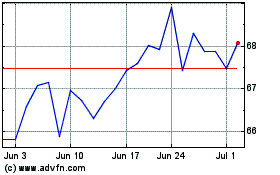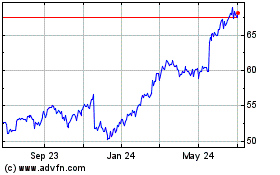TikTok Owner Puts Deal With Oracle, Walmart in Beijing's Hands -- Update
September 24 2020 - 3:57AM
Dow Jones News
By Liza Lin
TikTok's Chinese owner said it is seeking approval from Beijing
for a White House-endorsed plan to turn the short-video app into a
U.S.-based company, officially placing the fate of the year's
hottest social-media asset in the hands of Chinese authorities.
ByteDance Ltd. said Thursday that it had submitted its plan,
which involves partnering with Oracle Corp. and Walmart Inc., to
commerce authorities in the Chinese capital under recently expanded
export restrictions and is awaiting a decision.
China's ministries in charge of commerce, and science and
technology introduced surprise changes to the country's list of
restricted exports in August, adding data-processing technologies
such as content-recommendation algorithms in a move widely seen as
an effort to frustrate a campaign by President Trump to force a
sale of TikTok on national-security grounds.
Technologies on the list can't be exported without approval from
local Chinese officials. TikTok, and several of ByteDance's
social-media apps in China are well known for their use of
algorithms and artificial intelligence to tailor and push content
to its users, helping them build a sizable following.
Gao Feng, a spokesman for China's Commerce Ministry, said
Thursday in a weekly briefing that Beijing's commerce bureau had
received Bytedance's application for technology export. Mr. Gao
said the bureau would handle it according to regulations.
ByteDance spokespeople didn't immediately respond to a request
for comment for more details. The Beijing-based technology company
has said in the past that it would have to go through standard
regulatory approvals in China and the U.S.
The submission for Chinese-government approval adds to ambiguity
surrounding the TikTok deal, in which ByteDance, Oracle and Walmart
are set to turn the viral short-video app into a new company called
TikTok Global. The companies involved have issued clashing accounts
of how the deal would be structured. Meanwhile, Mr. Trump has
wavered in his support after saying he had approved the deal in
concept.
China's state media have added to the confusion by slamming the
deal as "dirty and unfair" after the editor of an influential
Communist Party tabloid offered cautious praise for it.
China's government hasn't commented on the deal since Mr. Trump
first said he had blessed it. Under the preliminary agreement,
TikTok's algorithm wouldn't change hands, the company has said.
ByteDance might still need to seek a green light from the
government even if the deal doesn't involve the direct transfer of
algorithms, as the export restrictions cover other forms of
technology sharing, including licensing of algorithms, said Fang
Jianwei, a partner at Zhong Lun Law Firm in Shanghai. With the deal
evolving, there could be parts that might fall under the law, and
thus ByteDance might want to play it safe by running it by relevant
authorities, he added.
Chinese state media have taken issue with the potential loss of
control over a highly valuable social-media property. Under the
terms of the preliminary agreement, Oracle and Walmart would take a
combined 20% stake in TikTok Global. ByteDance said it would own
the remaining 80%, while Oracle issued a statement saying that
Americans would be the majority owners of the restructured firm and
ByteDance would have no ownership in the new company.
China's official Xinhua News Agency became the latest to pile
on, calling the U.S. move to force ByteDance to sell the buzzy
social-media app "modern piracy" in an editorial published
Thursday.
"The U.S. pirate logic holds that any successful company that is
not American will have to become America's," Xinhua said. "In
trying to realize this goal, the U.S. is willing to bend accepted
rules and abuse national instruments to recklessly suppress
others."
Since a ban on the app in India during border tensions with
China earlier this year, the U.S. has become TikTok's biggest
overseas market, with roughly 100 million users. If ByteDance can't
get both governments to approve the deal, it will likely have to
shut down its U.S. operations.
Winston Ma, a former managing director at China Investment
Capital, the nation's sovereign-wealth fund, said the two countries
had different expectations about what "control" of the app means, a
divergence that could lead the Chinese to reject the deal.
China's government would likely accept an arrangement in which
Oracle manages the data while leaving the technology and
operational control in ByteDance's hands, said Mr. Ma, now an
adjunct professor at New York University's School of Law. "But the
new term sheet discussion suggests the U.S. will have majority or
full ownership of the company. It's an expectation gap to
close."
Grace Zhu contributed to this article.
Write to Liza Lin at Liza.Lin@wsj.com
(END) Dow Jones Newswires
September 24, 2020 03:42 ET (07:42 GMT)
Copyright (c) 2020 Dow Jones & Company, Inc.
Walmart (NYSE:WMT)
Historical Stock Chart
From Mar 2024 to Apr 2024

Walmart (NYSE:WMT)
Historical Stock Chart
From Apr 2023 to Apr 2024
